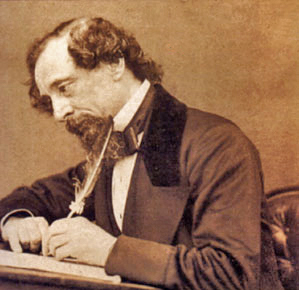Many of you are probably aware that Dickens's celebrated American tour of 1842 was prompted in no small part by his desire to make some money in the American market. His works were hugely popular here, but he earned not a nickel (or farthing) from their sale. By coming to the States he at least made some lucrative speaking fees. While he was here, he spoke out loudly in favor of an international copyright agreement--a topic that was not warmly received by his hosts. Then, as now, Americans considered themselves a specially moral nation; we really hate to have it pointed out when we don't live up to our ideals.
I spoke [Dickens wrote to a friend], as you know, of international copyright, at Boston; and I spoke of it again at Hartford. My friends were paralysed with wonder at such audacious daring. The notion that I, a man alone by himself, in America, should venture to suggest to the Americans that there was one point on which they were neither just to their own countrymen nor to us, actually struck the boldest dumb! Washington Irving, Prescott, Hoffman, Bryant, Halleck, Dana, Washington Allston -- every man who writes in this country is devoted to the question, and not one of them dares to raise his voice and complain of the atrocious state of the law. It is nothing that of all men living I am the greatest loser by it. It is nothing that I have a claim to speak and be heard. The wonder is that a breathing man can be found with temerity enough to suggest to the Americans the possibility of their having done wrong. I wish you could have seen the faces that I saw, down both sides of the table at Hartford, when I began to talk about Scott [Sir Walter, also hugely popular and widely bootlegged]...
I had no sooner made that second speech than such an outcry began (for the purpose of deterring me from doing the like in this city) as an Englishman can form no notion of. Anonymous letters; verbal dissuasions; newspaper attacks making Colt (a murderer who is attracting great attention here) an angel by comparison with me; assertions that I was no gentleman, but a mere mercenary scoundrel....Dickens got as far west as St. Louis. But I was delighted to discover recently that, in the imagination of one screenwriter, he made it to Nevada. On a 1963 episode of the TV Western series Bonanza, Dickens read in Carson City--where he found the audience had his work memorized already--and in one remarkable scene, gave Hoss Cartwright an impassioned defense of intellectual property.
Yes, that's Jonathan Harris--better known as Dr. Smith of Lost in Space--as the great novelist. You can see him read from Oliver Twist here. To judge by Mark Twain's review of Dickens reading in New York, Harris may be better at the job than the great man himself.
Update: it is both ironic and probably inevitable that the YouTube clip of Dickens defending copyright has been removed because of copyright infringement! I recently saw it posted, however, on another YouTube page. Rather than give you another link that may go out of date, I suggest you search for the TV show under "Bonanza Charles Dickens" or the episode's title, "A Passion for Justice."
(Hat tip to the excellent Charles Dickens Page for these quotations.)

4 comments:
"Come, Horse! There's work to be done!" I shall record that as my alarm-message.
Peter, that is easily the best reading I have done today. I am a huge fan of Dickens, and it is always a pleasure to learn more about him. Thank you for such an informative post.
On topic, I seem to be coming across a lot of historical information like this. I spent some time today reading about Thomas Edison and Nikola Tesla. Shocking information.
Michael: he did seem to call him "Horse," didn't he?
D. Antone, thanks for your comment. As for Tesla and Edison, their relationship was complex and murky, and Tesla certainly got a raw deal. However, Tesla is one of those figures who has attracted rabid partisans and conspiracy theorists, and there's a good deal of misinformation about him abroad, especially on the web.
If you'll pardon me for plugging my own product, I'd recommend Maury Klein's excellent and highly readable history of the early years of electricity, THE POWER MAKERS, which recounts the whole turbulent era of Edison, Tesla, Westinghouse, and many others. It certainly makes clear that with respect to intellectual property, the electric business made the book business look tame. Edison and his competitors were constantly suing each other for patent infringements.
I'm watching this very Bonanza episode at the moment and, for the life of me, couldn't figure out what Dickens was doing in Nevada. But, of course, I suppose that's where suspension of disbelief comes in.
Great post and very interesting (and, of course, timely!) stuff.
Post a Comment